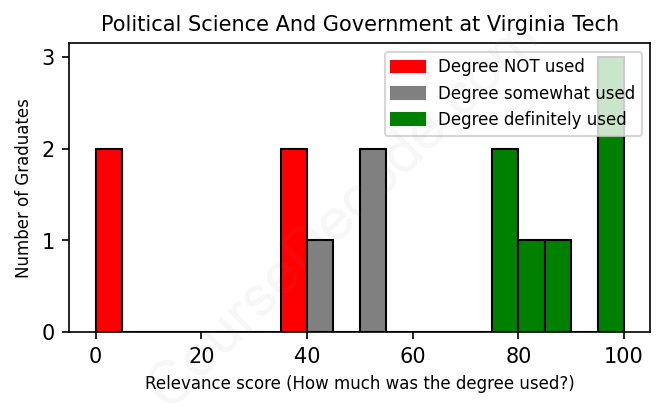
First, some facts. Of the Political Science And Government graduates from Virginia Tech we've analyzed , here's how many have used (or NOT used) their degree in their career:

These are estimates based on AI analysis of 14 LinkedIn profiles (see below).
The verdict? Below average. Overall, with an average relevance score of 59%, Political Science And Government graduates from Virginia Tech have a lower likelihood (-8%) of finding work in this field compared to the average graduate across all fields:
And for comparison, here's the chart for all profiles we've looked at across all degrees.
Also, after graduating, 42% of these graduates have pursued further education other than another Bachelor's degree (such as a Masters degree or other), compared to the average across all profiles of 35%. This suggests you may need more than just a Bachelors degree to be competitive as a Political Science And Government graduate.
See the details:
|
Relevance score: 100% We think this person has gone into a career highly relevant to their degree. We think this person has gone into a career highly relevant to their degree.
DEGREE INFOGraduated in 2018 from Virginia Tech with a Bachelor's degree in Political Science And Government. Also pursued further education since (see below). JOB HISTORY SINCE GRADUATIONParalegal HIRSCH & TUBIOLO PC Jan 2020 - Present FURTHER DEGREES DONE SINCE GRADUATINGMaster's degreeUniversity of Glasgow 2018 - 2019 ABOUTMSC in Transnational Crime Justice and Security from the University of Glasgow. Experience working in high stress, fast paced work environments, managing interpersonal communication and meeting customers' requests. Experienced in resolving conflicts quickly and efficiently and adapting to new situations. I have experience in researching and analyzing legal documents, crime prevention, and criminal justice policy |
The top 10 most common jobs done by the graduates we've analyzed (ranked most common to least) are:
Based on the data from LinkedIn profiles of graduates from Virginia Tech with degrees in Political Science and Government, it's clear that many of them have pursued careers in both government-related and non-governmental fields. A notable number opted for positions like military officers, congressional interns, or roles within organizations focused on political strategy, which align tightly with their educational background. These jobs often draw on essential skills learned in their studies, encompassing areas like leadership, strategic planning, and understanding governmental processes. For instance, many who have served as officers in the U.S. Air Force or Army, or as interns in congressional offices, demonstrate a direct application of political science knowledge.
However, it's also striking to see a significant portion of graduates ending up in roles that don't relate closely to political science, such as accountants, financial analysts, or marketing associates. These positions primarily hinge on financial, operational, or technical skills, which may not necessarily require any understanding of political systems or government. While some of these roles might intersect with political themes like economic policy or organizational management, they largely veer away from the core purposes of their degree. So, while graduates engage in various occupations, only a portion directly utilizes the specific training from their Political Science and Government studies, leading to a mixed picture of relevance and applicability in the job market.
Here is a visual representation of the most common words in job titles for Political Science And Government graduates (this is across all Political Science And Government graduates we've analyzed, not just those who went to Virginia Tech):

When we look at graduates from Virginia Tech who studied Political Science and Government, we start to see some interesting patterns in their career trajectories. For many, their first jobs right after graduation often seem to lean towards roles in administration, operations, and internships related to government or law. For instance, a 2010 graduate started as a credit administrator and moved up the financial ranks, while another went right into the U.S. Air Force, showcasing a commitment to public service from the get-go. Even more recent graduates like those from 2018 and 2020 have taken on positions in child protective services, social work, and even paralegal work—still firmly rooted in helping or understanding governmental systems and social structures.
Fast forward five to ten years later, and you can see that many of these folks have continued to ascend in their careers, particularly in law and military roles. Several graduates, like the 2015 alum who became a general counsel and founded their own law firm, have clearly carved out successful paths in the legal sector. Others have taken on significant positions within the military, defense, and public policy sectors, which demonstrates a strong correlation between their degree and the career choices they've pursued. While some have ventured into unrelated fields, such as marketing or sales, many have maintained ties to their political science roots, reflecting a blend of practical skills and a passion for societal issues. Overall, it's clear that a degree in Political Science and Government from Virginia Tech can lead to a range of fulfilling and relevant career opportunities.
Hey there! So, getting a Bachelor’s degree in Political Science and Government at Virginia Tech, or really anywhere, can be a bit of a mixed bag. It’s not the easiest degree out there, but it’s also not like you're scaling Mount Everest! You'll definitely be doing a lot of reading, writing papers, and engaging in discussions about political theories, systems, and current events. Some classes can be pretty challenging, especially if you’re not super into the subject matter or don’t enjoy dissecting complex ideas. But if you have a genuine interest in politics and stay on top of your assignments, you’ll likely find it manageable. Overall, it’s about average difficulty relative to other majors, but your experience can really depend on your passion for the topic!
Most commonly, in the LinkedIn profiles we've looked at, it takes people 4 years to finish a Bachelor degree in Political Science And Government.
Looking at the job paths of these Virginia Tech grads in Political Science and Government, it seems like a mixed bag when it comes to making decent money. The 2010 grad who moved up to roles at Lockheed Martin probably did pretty well, given the reputation of the company and the types of financial roles they held. The Air Force officer from the same year is likely also sitting comfortably, especially with the added benefits that come with military service. However, some of the more recent grads, like the ones in social work or entry-level positions, might be earning lower salaries as they start out, particularly since jobs in nonprofits or education often don't pay as well as corporate roles. Overall, while some are definitely on a solid financial path, others might still be working their way up to better-paying positions.
Here is a visual representation of the most common words seen in the "about" section of LinkedIn profiles who have a Bachelor degree in Political Science And Government (this is across all Political Science And Government graduates we've analyzed, not just those who went to Virginia Tech). This may or may not be useful:

Here are all colleges offering a Bachelor degree in Political Science And Government (ordered by the average relevance score of their Political Science And Government graduates, best to worst) where we have analyzed at least 10 of their graduates: